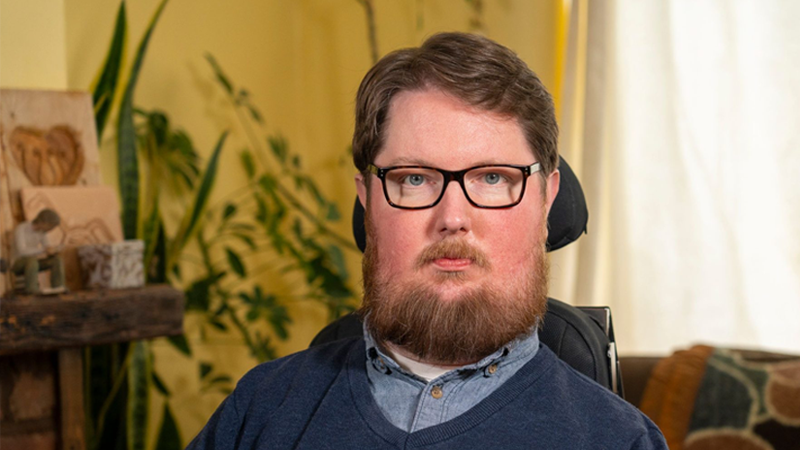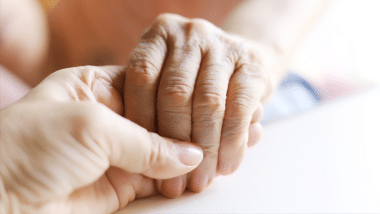Changing the law in Scotland to allow assisted suicide is a “dangerous” proposition that MSPs should reject, a disability campaigner has said.
In the coming months, Holyrood is set to consider a Bill from Lib Dem MSP Liam McArthur which seeks to allow residents aged 16 or over and deemed to be terminally ill to be prescribed drugs to kill themselves.
In The Herald newspaper, disability policy advisor Dr Miro Griffiths wrote that legalising assisted suicide would open an uncontrollable “Pandora’s Box”.
Laws working badly
Dr Griffiths has “progressive” and “life-limiting” conditions which restrict him to a wheelchair and mean physical movement is primarily limited to his fingers. After years of research, he argues that assisted suicide is “inherently unsafe”.
He cited evidence from Canada, which introduced ‘Medical Assistance In Dying’ (MAID) in 2016. While the law originally only permitted those with terminal illnesses whose deaths were deemed ‘reasonably foreseeable’ to get help to kill themselves, it was quickly expanded to those who are not likely to die in the near future. From next year those with mental illnesses will also be included.
One man, Alan Nichols, was admitted to hospital due to mental health issues but was helped to kill himself on the grounds of “hearing loss”.
In seven years, the number of those seeking assisted suicide or euthanasia has risen tenfold, while there are also reports of those who do not wish to die feeling forced to opt for an assisted death.
Pressure on vulnerable
Dr Griffiths highlighted cases of others feeling pressured to end their own lives, including Roger Foley, who says that due to the cost of his care, medics have pressured him to opt for assisted suicide.
A former Paralympian enquired about a wheelchair lift to make access to her home easier, only to be told that assisted suicide was an option. Army veterans seeking medical help for their injuries have also been pointed towards MAID.
Another woman sought help for her suicidal thoughts. The doctor who spoke to her said there are too many seeking help for mental health issues and suggested she seek assisted suicide.
Dr Griffiths said: “This chilling case underlines the danger of putting life-ending interventions alongside traditional, more resource-heavy forms of support.”
Slippery slope
Activists say the law in Scotland would be strict, but Dr Griffiths noted: “The problem with this assertion is that in other nations where the practice is legal, supporters said the same thing. Intention does not necessarily match outcome – and with this issue, it never does.”
In other jurisdictions, eligibility criteria have been expanded, waiting periods have been cut, and the requirement to be deemed terminally ill has been dispensed with.
Dr Griffiths continued: “We also see reports of an impact on palliative care – despite claims by campaigners to the contrary. Two weeks ago, it was reported that the government of New South Wales, Australia, has cut $150 million of palliative care funding, whilst injecting money into ‘assisted dying’. Palliative experts in the UK also warn of an impact, were our laws to change.”
‘Pandora’s Box’
He concluded: “Supporters of ‘assisted dying’ describe their desire for a narrow, safe law but the truth is they cannot guarantee this – no matter how the law is drafted. Safeguards fail, are eroded, and are dispensed with. Laws expand.
“When this happens, disabled people, the poor, the vulnerable and the marginalised are worst affected. The only sure way to avoid abuses and permissive legislation is to keep the Pandora’s Box of ‘assisted dying’ closed.
“There is a better way forward for Scotland, involving improvements in end-of-life care, greater suicide prevention, and better affirmation and inclusion of marginalised communities. I urge MSPs to choose this path.”
Humza Yousaf and his Health Secretary reaffirm assisted suicide opposition
Columnist: ‘Scotland must back away from cliff-edge of assisted suicide’
Challenging assisted suicide: ‘We must care for those who are suffering, not end their lives’
Palliative care doctors in Scotland overwhelmingly oppose assisted suicide proposals




